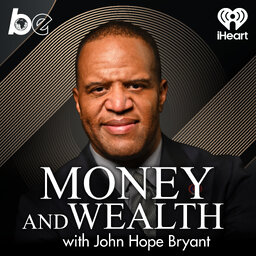The 6 Layers: From Fake Rich to Real Generational Wealth
In this episode, John breaks down the different levels of wealth - from broke to generational wealth.
In 1 playlist(s)
Money & Wealth With John Hope Bryant
John Hope Bryant- successful entrepreneur, executive and philanthropist –will dispense his trademark…Social links
Follow podcast
Recent clips

Turning No Into a Lease
12:17

Built for the Storm: How to Protect, Survive & Thrive in Uncertain Times
54:29

Speak Wealth: Learning the Language They Never Taught Us
23:50
 Money & Wealth With John Hope Bryant
Money & Wealth With John Hope Bryant